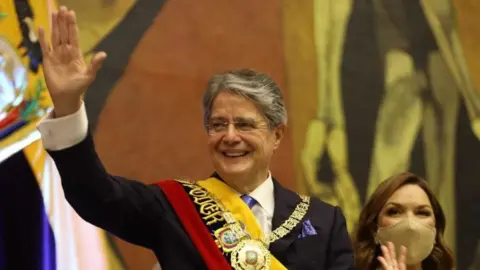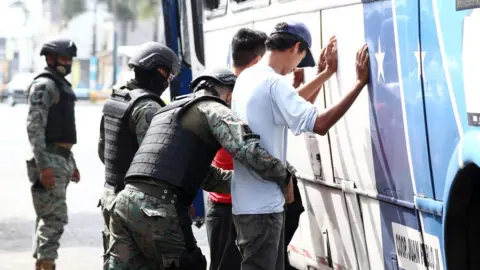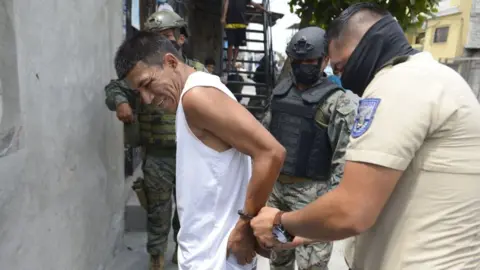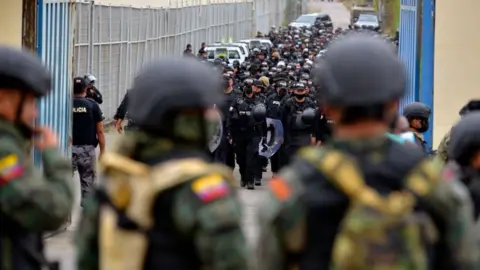Ecuador president: More than batons needed to control jails
 Ecuador Presidency
Ecuador PresidencyWhen Guillermo Lasso took up office as Ecuador's president in May, there was little doubt that he would face an uphill struggle.
The images of bodies lying in the streets of Guayaquil as Ecuador's most populous city struggled to bury those who had died from Covid were still fresh in people's minds.
Not surprisingly, the newly elected president's priority was to turbocharge the country's slow vaccination campaign, which he argued would also provide a badly needed economic boost after a slump made worse by the pandemic.
Mr Lasso met his campaign promise of vaccinating nine million people in less than 100 days, but less than six months into his presidency he has declared a state of emergency to combat what he says is another scourge: a crime wave driven by drug trafficking gangs.
 Getty Images
Getty ImagesLast month, it took hundreds of police officers to regain control of a prison in Guayaquil in which 119 inmates were killed in a fight between rival gangs.
The deadly fight, which saw some inmates decapitated, drew attention to the growing influence in Ecuador of transnational crime gangs such as the Mexico-based Sinaloa and Jalisco New Generation cartels.
In a BBC interview, President Lasso said that his government was regaining control not only of the prisons but also of areas of Ecuador where drug traffickers had gained a foothold.
"The two previous governments were too passive when it came to fighting drug trafficking," he said.
"We've installed a radar to regain control of the province of Manabí and that of Santa Elena," the president said of his government's efforts to cover "blind spots" in the airspace which gangs take advantage of to traffic drugs aboard small planes.
Mr Lasso is also pushing a bill which will allow the air force to shoot down unauthorised aircraft that do not obey the orders of the military.
But the president warned that it will take time to tackle what he said was the more serious problem of drug use.
 AFP
AFP"We have a problem and that's crime stemming from drug consumption. We're going to tackle it as a public health problem but it's going to take more than a decade until our Ecuadorean society can recover from this scourge and the insecurity it breeds," he said.
The president added that he was under no illusion that the current state of emergency is no more than a sticking plaster.
"It's a measure to increase security in the cities, but I have to be very frank, it is not going to be the ultimate solution, it's going to take a lot longer than 60 or 120 days to solve this problem," he told the BBC.
The president added that Ecuador would need international support from neighbouring Colombia, the US and the EU to strengthen its armed forces and police to combat the growing influence of transnational crime gangs.
Mr Lasso has more immediate plans for regaining control of Ecuador's jails which include better technology to monitor inmates and reducing the number of prisoners.
 AFP
AFP"The overcrowding we have at present amounts to 9,000 people, 5,000 of which qualify for release, so we're just trying to speed up the process. Of the remaining 4,000, there are almost 3,000 which can be repatriated because they are foreign nationals," Mr Lasso explained.
"Within two years, the problem of overcrowding can be solved."
But in the short term, Mr Lasso wants those guarding the prisoners to be armed.
"There is no way that prison guards who only carry batons can confront mafias which have drones and explosives," he said.
"This situation dates back to a different Ecuador, when drug trafficking and mafias were not yet a threat. In today's Ecuador we need legal reforms so police can go into the prisons."
But the president said that in the long term, he is betting on more support for drug addicts and creating more employment opportunities for all Ecuadoreans to drive down crime.
"We don't want to build more prisons in Ecuador, we want a freer Ecuador."

